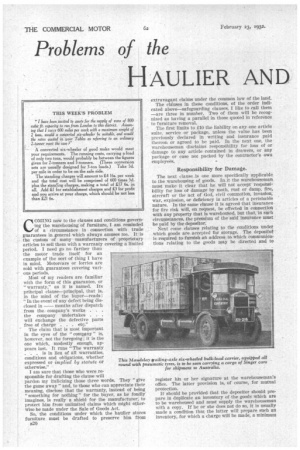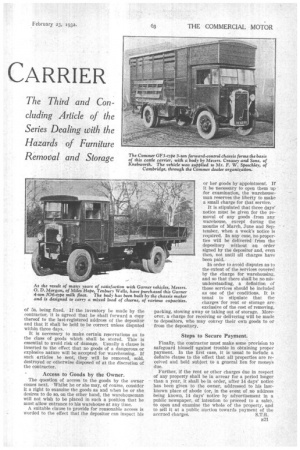Problems of the
Page 54

Page 55

If you've noticed an error in this article please click here to report it so we can fix it.
HAULIER AND CARRIER
The Third and Concluding Article of the Series Dealing with the Hazards of Furniture Removal and Storage
COMING now to the clauses and conditions governing the warehousing of furniture, I am reminded
of a circumstance in connection with trade guarantees in general which always amuses me. It is the custom of many manufacturers of proprietqy articles to sell them with a warranty covering a limited period. I need go no farther than the motor trade itself for an example of the sort of thing I have in mind. Motorcars or lorries are sold with guarantees covering various periods.
Most of my readers are familiar with the form of this guarantee, or "warranty," as it is named. Its principal clause—principal, that is, in the mind of the buyer—reads: "In the event of any defect being disclosed in — months after dispatch from the company's works . . . the company undertakes . ., . will exchange the defective parts free of charge . . . etc."
The claim that is most important in the eyes of the " company " is, however, not the foregoing; it is the one which, modestly enough, appears last. It runs "The warranty . . . is in lieu of all warranties, conditions and obligations, whether expressed or implied by statute or otherwise."
I am sure that those who were responsible for drafting the clause will pardon my italicizing those three words. They " Ove the game away " and, to those who can appreciate their
meaning, disclose that the warranty, instead of b ng "something for nothing" for the buyer, as he fon lly imagines, Is really a shield for the manufacturer to protect him from unlimited claims which might otherwise be made under the Sale of Goods Act.
So, the conditions under which the haulier st res furniture must be drafted to preserve him f om B20 extravagant claims under the common law of the land. The clauses in these conditions, of the order indicated above—safeguarding clauses, I like to call them —are three in number. Two of them will be recognized as having a parallel in those quoted in reference to furniture removal.
The first limits to the liability on any one article suite, service• or package, unless the value has been previously declared in writing and insurance paid thereon or agreed to be paid. In the next one, the warehouseman disclaims responsibility for loss of or damage to any article contained in drawers, or any package or case not packed by the contractor's own employees.
Responsibility for Damage.
The next clause .is one more specifically applicable to the warehousing of goods. In. it the warehousetnan must make it clear that he will not accept resptinsibility for loss of' damage by moth, rust or damp, fire, aircraft or the act of God, civil commotion, invasion, war, explosion, or deficiency in articles of a perishable " nature. In the same clause it is agreed that insurance for fire risk will, on request, be effected in connection• with any property that is warehouSed, but that, in such circumstances, the premium of the said insurance must be paid by the depositor.
Next come clauses relating to the conditions under which goods are accepted for storage. The depositot is required to .furnish an address to which Communica7 dons relating to the goods may be directed and to register his or her signature at the warehouseman's office. The latter provision is, of course, for mutual protection. It should be provided that the depositor should prepare in duplicate an inventory of the goods which are to be warehoused and must supply the warehouseman with a copy. If he or she does not do so, it is usually made a condition that the latter will prepare such an inventory, for which a charge will be made, fl minimum
of 5s. being fixed. If the inventory be made' by the contractor, it is agreed that he shall forward a Copy thereof to the last-registered address of the depositor and that it shall 'he held to be correct unless disputed within three days.
It is necessary to make certain reservations as to the class of goods which shall be stored. This is essential to avoid risk of damage. Usually a clause is inserted to the effect that no goods of a dangerous or explosive nature will be accepted for warehousing. If such articles be sent, they will be removed, sold, destroyed or otherwise disposed of at the discretion of the contractor,
Access to Goods by the Owner.
The question of access to the goods by the owner comes next. Whilst he or she may, of course, consider it a right to examine the goods as and when he or she desires to do so, on the other hand, the warehouseman will not wish to be placed in such a position that he must allow entrance to his warehouse at any time.
A suitable clause to provide for reasonable access is worded to the effect that the depositor can inspect his or her goods by appointment. If it be -necessary to open them up for examination, the warehouseman reserves the liberty to make a small charge for that service.
It is stipulated that three days' notice must be given for the removal of any goods from any warehouse, except during the months of March, June and September, when a week's notice is required. In any case, no properties will be delivered frOm the depository without an order signed by the depositor and, even then, not until all charges have been paid.
In order to avoid disputes as to the extent of the services covered by the charge for warehousing, and so that there shall be no misunderstanding, a definition of those services should be included as one of the conditions. It is usual to stipulate that the charges 'for rent or storage are exclusive of the cost of removing, packing, stowing away or taking out of storage. Moreover, a charge for receiving or delivering will be madc to depositors, who may convey their own goods to or from the depository.
Steps to Secure Payment.
Finally, the contractor must make some provision to safeguard himself against trouble in obtaining proper payment. In the first case, it is usual to include a definite clause to the effect that all properties are received and held subject to a general lien for moneys due.
Further, if the rent or other charges due in respect of any propenty shall be in arrear for a period longer than a year, it shall be in order, after 14 days' notice has been given to the owner, addressed to his lastknown place of abode (or, in the event of no address being known, 14 days' notice by advertisement in a public newspaper, of intention to proceed to a sale), to open and examine the whole of the property, and to sell it at a public auction towards payment of the accrued charges. S.T.R.




































































































